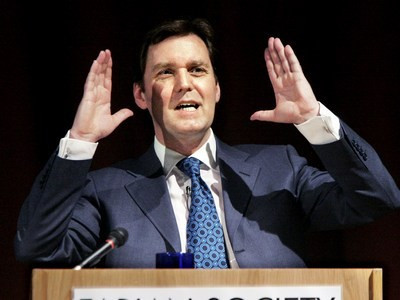Social Mobility Adviser Alan Milburn Repeats Radical Policy Demand

When the government's social mobility tsar Alan Milburn released his weighty report in October into the problem that continues to haunt British society, many expected it would be quietly left to fade away on the back of a high shelf.
That, after all, has been the fate of previous reports. First they are welcomed as an important analysis of a major social problem amid promises of action, then they are forgotten as ministers are overwhelmed by the magnitude of the task and other, more immediate, issues crowd them out.
Now we are being encouraged to believe it will be different this time. Ministers have repeatedly referenced the issue, John Major has driven it up the agenda with a series of significant interventions and now, in some of his clearest words yet, David Cameron has suggested real initiatives are imminent, although there are no details as yet.
Miliband, meanwhile, has returned to his task with some stark comments that underline just how massive the task is and how politicians have for decades failed to show the long-termism or commitment to taking it on.
Speaking to the Resolution Foundation, he agreed with Major that it was shocking that the upper echelons of society were still dominated by a privileged elite and that it was wrong to blame a single government. The real problem was the breakdown of the link between economic growth and wage levels, he said.
His analysis remained pretty bleak and his solutions would be radical and not the sort which naturally appeal to governments, particularly in the run-up to an election.
"Economic recovery is unlikely to halt the trend of the last decade, where the top part of society prospers and the bottom part stagnates. A recovery that sees national wealth rise might be an economic success but if earnings fall it will be a social failure," he said.
He also dismissed short-term policies including Ed Miliband's promised energy prices freeze.
"The problem is that the answers that the political parties are reaching for, whether caps on gas bills or more competition in the energy market, can at best, provide only short-term respite. What is lacking across the political spectrum is a long-term answer about how the gap between earnings and prices can be closed," he said.
He repeated proposals made in his original report including cutting some pensioners' benefits such as free bus passes to help young unemployed, to force firms to publish wage rates and differentials, boost spending on childcare, banning unpaid internships and doing more to help the poor with parenting, even if it required "taking on the Daily Mail argument about the nanny state".
His proposals are undoubtedly wide-ranging and radical and would require the coalition to change policies. The notion of cutting pensioners' benefits would break part of the coalition agreement and has already been rejected by the government, for example.
But with the rhetoric surrounding the issue of social mobility being cranked up on an almost daily basis, it will be hugely embarrassing if action does not follow.
© Copyright IBTimes 2025. All rights reserved.






















